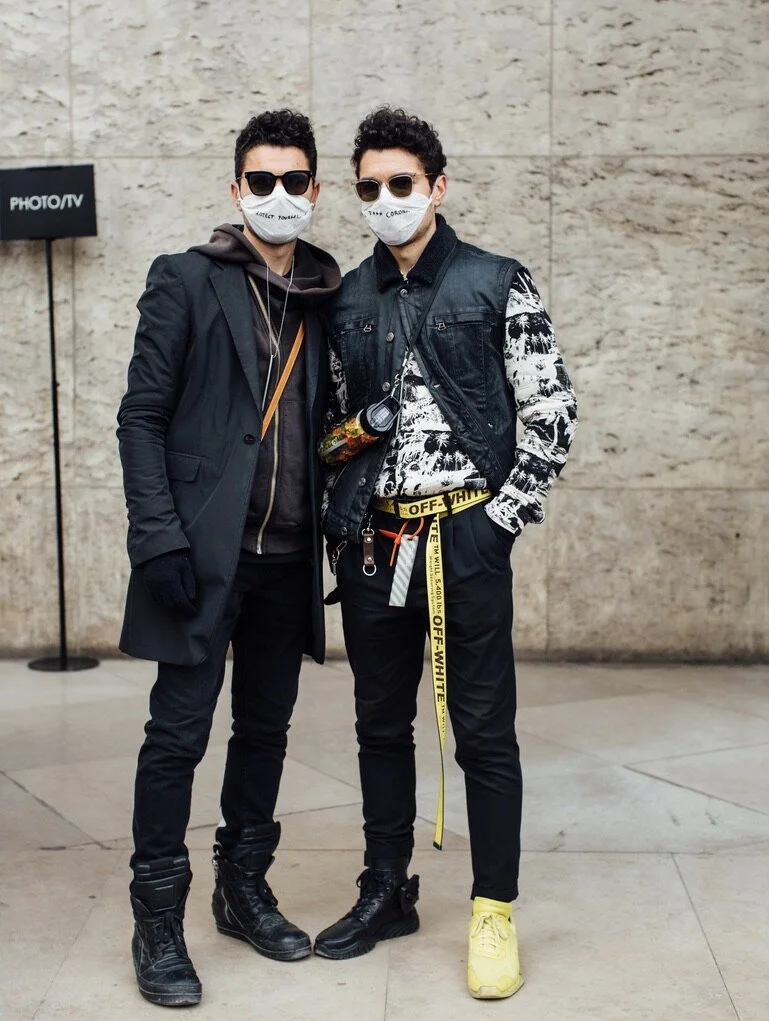How the Coronavirus is Impacting Fashion: From Face Masks to Delayed Production
As concerns about the coronavirus spread, fashion week attendees have learned to say “hello” differently. Rather than shake hands or “air kiss,” attendees squeeze each other’s arms. The gesture is warm and informal. More importantly, the greeting doesn’t require skin-to-skin contact. And, as Jess Cartner-Morley writes in The Guardian, this gesture is gaining popularity: “The trend sweeping Paris fashion week, which looks poised to catch on globally, is not a hemline or a handbag but a new form of greeting: the upper arm squeeze.”
And as Paris Fashion Week attendees greet one another differently, so too do they wear face masks. Due to the demand, the Airinum Urban Mask 2.0 sold out recently in three colors; Gwyneth Paltrow posed on her flight to Paris, while wearing the onyx black version of this mask (see image, above).
However, while images of masked-attendees populate the internet, the fashion industry’s response to the coronavirus has been mixed. The Chinese brands Shiatzy Chen, Masha Ma, Calvin Luo, Uma Wang, and Maison Mai all cancelled their Paris shows. Both the Beijing and Shanghai fashion weeks have been concealed. The largest furniture and eyewear fairs, Salone del Mobile and MIDO, have been pushed from spring to June. And Giorgio Armani staged his Milan catwalk show to empty seats; less than 24 hours before the show was scheduled to start, guests were told to watch the live stream, instead. Giorgio Armani himself bowed on stage, before rows of empty seats. Meanwhile, Dolce & Gabbana proceeded with its live show - illustrating the extraordinarily varied responses to the outbreak.
And while the virus continues to impact this winter’s fashion shows, it is also predicted to have long-term economic consequences, within the global fashion industry. The Chinese population constitutes approximately 40% of the world’s luxury fashion house customers. And Bernstein and Boston Consulting Group estimates that the virus could cost the 2020 worldwide luxury industry up to $43 billion.
China produces more garments than any other nation on Earth; the country manufactures over a third of all textiles and clothing, globally. And factories across China are currently closed, due to the virus. Many Chinese manufacturers traveled home for Chinese New Year, and have been unable to return to their factories (due to shutdown public transportation and locked-down cities). And this will impact brands as varied as Prada, Zara, H&M, and Armani.
In her article for Fast Company, Elizabeth Segran bluntly states that all fashion brands that source from China will experience significant inventory delays - meaning that brands will struggle to meet the demand of their shop-floors. And while no one knows the extent to which the fashion industry will be impacted by the virus, it’s clear that the virus’s impact will be significant.
Click here, for thumbnail image source.












